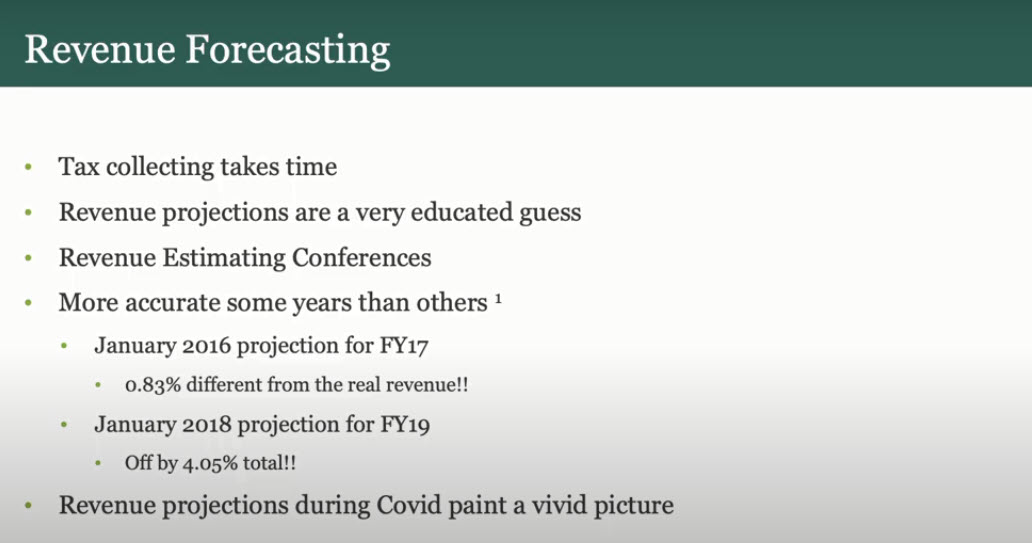IPPSR Fellow Michael Breslin took part in the 2021 University Undergraduate Research and Arts Forum, a showcase for student scholarship and creativity. This is one student's account of how he came to participate and what this year's virtual showcase meant to him.
How did you decide on this topic?
For my presentation, I researched how Michigan’s budget was impacted by Covid. I chose this topic for a couple reasons. First, during the course of this year, much of my work for IPPSR revolved around Michigan’s budget, both its revenue and expenditures. I wrote a blog post abouts the state’s fiscal year 2021 budget when it took effect in October. I wrote another article about the accuracy of the state’s revenue projection. Therefore, not only was I interested in the topic, but I knew enough about it such that I was able to build on the research I had done for those blog posts to create a more comprehensive research presentation.
Another reason I wanted to research Michigan’s finances amidst Covid was because I was curious about how Michigan fit into  the wider discussion of state fiscal health across the country. In the last few months leading up the passage of Biden’s American Rescue Plan, there’d been a pretty extensive debate about whether state governments should be receiving more federal aid. Some people said states were bringing in better-than-expected revenues, and therefore, they did not need more federal money. Other people said that oversimplifies reality, and that states still need financial help. So, I really just wanted to investigate that question and try to paint a nonpartisan picture of the situation, using Michigan as a model.
the wider discussion of state fiscal health across the country. In the last few months leading up the passage of Biden’s American Rescue Plan, there’d been a pretty extensive debate about whether state governments should be receiving more federal aid. Some people said states were bringing in better-than-expected revenues, and therefore, they did not need more federal money. Other people said that oversimplifies reality, and that states still need financial help. So, I really just wanted to investigate that question and try to paint a nonpartisan picture of the situation, using Michigan as a model.
How did you complete research during the pandemic?
Essentially all of the data I used was easily accessible online. The fiscal agencies in Michigan do a great job of organizing revenue and budget documents and making them easy to find. So, to do the research, I first collected all the data I needed. That included reports from the Revenue Estimating Conferences held during Covid, data on the state’s revenue sources, and budget documents for fiscal year 21 and 22. Then, I put all this data in a couple of spreadsheets and analyzed them.
I don’t think my actual research process was impacted by Covid. What was tougher due to the pandemic, though, was easily finding help. I think in a normal year, I could just ask friends or professors for input if I was struggling a bit, but because of Covid, that was obviously harder. Professor Grossman, though, was super helpful during the process. At one point, I was pretty overwhelmed by the sheer amount of data out there about Michigan fiscal health. I was seeing a lot of confusing and conflicting messages in the news. So I talked to Professor Grossman about it. He really helped me better understand the numbers I was working with, find the most important data, and make sense of all the info I was getting lost in.
What did you learn?
In terms of the research question that I wanted to answer—if states need more federal aid—I learned that it is a nuanced question. I think both sides of the argument have strong merits. Ultimately, though, I found that the fiscal situation, at least in Michigan, is not as rosy as many news stories have made it out to be. Many people have pointed to “better-than-expected” revenue as evidence that states don’t need more federal funds. In May 2020, fiscal year 20 revenue was projected to be $21.7 billion. But by January 2021, those projections increased by 14% to $24.7 billion. So, yes, it is true that revenue projections have improved. However, Michigan revenue is not entirely in the clear. General Fund revenue is projected to drop by over 3% in fiscal year 20, and by almost 5% in fiscal year 21. States are still hurting financially contrary to some popular belief. Therefore, I think they are deserving of more federal funds (and states did end up getting federal stimulus in Biden’s American Rescue Plan). But, I think the debate ultimately comes down to how much money someone thinks the federal government should be spending: many Republicans say less, and many Democrats say more.
In all, UURAF was an outstanding opportunity to explore and share my interest in state fiscal policy. It also helped me develop my research skills, which I will be able to apply in the future to a career in policy analysis.
We look forward to seeing IPPSR Undergraduate Policy Fellow Michael Breslin back on campus this coming fall. He'll be a senior at MSU studying political science, international development, and history. His primary research interest is economic policy. He previously worked as a communications intern for Mayor Lori Lightfoot of Chicago. See his UURAF presentation here.



